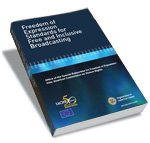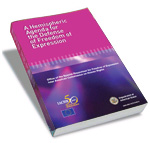Freedom of Expression
Media Concentration
Basic Principle
Declaration of Principles on Freedom of Expression adopted by the Inter-American Commission on Human Rights in 2000.
Pluralism, Diversity and Freedom of Expression.
Speech by Toby Mendel, Senior Legal Advisor of Article XIX
Special Session of the Permanent Council of the OAS regarding the Right to Freedom of Thought and Expression and the Importance of Communications Media.
Date: April 24, 2009
Publications
 Freedom of Expression Standards for Free and Inclusive Broadcasting (2009)
Freedom of Expression Standards for Free and Inclusive Broadcasting (2009) ![]()
This publication shows the guidelines that have been developed by the Inter-American Court and the Inter-American Commission and the Office of the Special Rapporteur for Freedom of Expression, regarding the need for an adequate regulation of the radioelectric spectrum to ensure free, independent, vigorous, plural, and diverse broadcasting, to insure, as a result, the greatest circulation of information and opinions.
 A Hemispheric Agenda for the Defense of Freedom of Expression (2009)
A Hemispheric Agenda for the Defense of Freedom of Expression (2009) ![]()
This publication, in addition to summarizing the inter-American standards for freedom of expression, recognizes the regional advances achieved in the Americas with respect to the full guarantee of the right to freedom of expression, describes the main difficulties and challenges currently facing the right to freedom of expression in the region, and presents a series of concrete, viable and feasible recommendations that the Office of the Special Rapporteur considers necessary to face these challenges.

